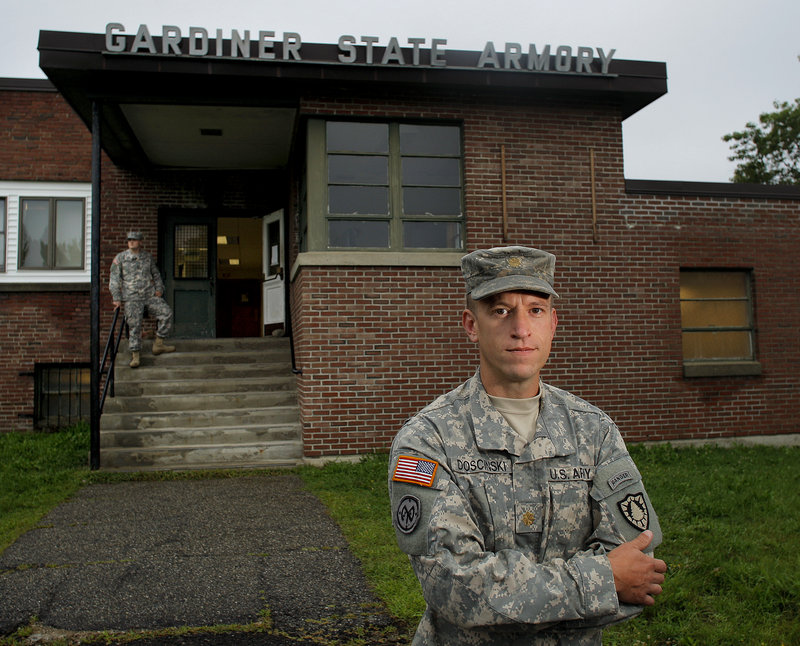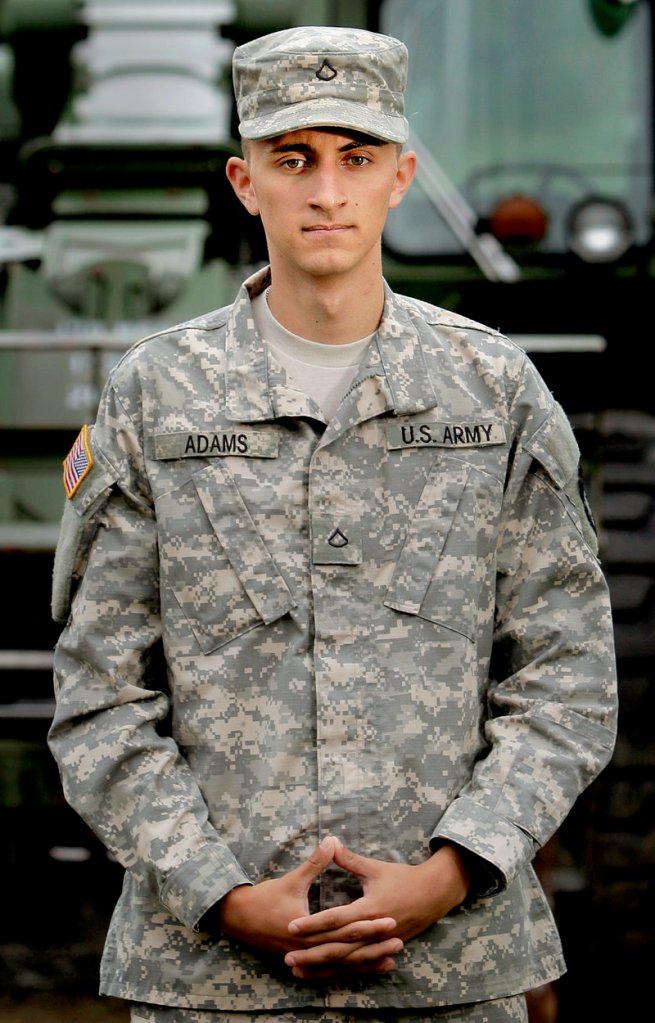Go ahead and admit it: The last time you gave serious thought to U.S. troops still serving in a faraway war zone was … when?
“Things have changed, that’s pretty clear,” said Maj. Joshua Doscinski of Vienna, operations officer for the 133rd Engineer Battalion, in the quiet of the Maine Army National Guard’s Gardiner armory Friday morning.
“I think it’s indicative of where we are as a country,” Doscinski continued. “I don’t feel slighted because of that. I think it’s just the reality that people are a little tired of it — it’s been in the news for over a decade now.”
Well, fellow Mainers, like it or not, here’s yet another war bulletin: One week from Tuesday, 139 men and 23 women from the 133rd will board a chartered plane in Portland and head off to six weeks of mobilization training at Camp Shelby in Mississippi.
From there, in early October, they’ll head for Bagram Airfield in Afghanistan and nine months with the CENTCOM Material Retrograde Element — Army-speak for dismantling a war that dates all the way back to Oct. 7, 2001.
“I was in second grade,” said Pfc. Seth Adams of Brunswick, 18, recalling the Sept. 11 attacks that preceded the start of Operation Enduring Freedom by less than a month. “If you look at your life like a slide show, all of the other slides are like an inch wide — and 9/11 is like 3 feet wide. It just sticks out.”
They could easily serve as bookends to the 133rd’s history over the last decade: Doscinski, the seasoned soldier now on his third trip into harm’s way, and Adams, the teenage son of a family rich in military tradition who fervently believes his every day in theater, even as the war shrinks before his eyes, will bring the Afghan people “a little bit closer to freedom.”
Doscinski, who joined the 133rd 10 years ago this summer after four years in the regular Army, served as a battle captain when the battalion deployed to Mosul, Iraq, from March 2004 through February 2005.
Back in those days, it seemed all of Maine was fixated on the 133rd’s mission to Mosul, one of 24 Maine Guard unit deployments to either Iraq or Afghanistan in the past decade.
Contrast that with today, with Operation Iraqi Freedom now history and Operation Enduring Freedom fast approaching its conclusion by the end of 2014. Bring up the war in casual conversation these days and you’re more likely to hear, “The war in Afghanistan? Isn’t that over yet?”
Almost. And that’s where the 133rd comes in.
Where once they built things — schools, health clinics, roads, bridges — throughout northern Iraq, they now will focus on taking things down.
As the U.S. troop levels in Afghanistan steadily drop from 68,000 in March to 34,000 by early next year to between zero and 15,000 come January 2015, the combat engineers’ mission is to convert combat outposts and forward operating bases to Afghan use, in some cases, and, in others, to erase them altogether.
Not quite as uplifting as trying to build Iraq’s future, to be sure. Yet as the large, earthen HESCO barriers and other defenses steadily come down all over the barren Afghan landscape, the risk of attack by the Taliban and others looms all the larger.
That no doubt weighed heavily on Adams’ parents’ minds back in September 2011 — the start of their son’s senior year at Mt. Ararat High School in Topsham. The day he turned 17, Adams asked for and received their written permission to enlist.
Despite his family’s deep military lineage — his father served as a Marine, his grandfather was an Army sergeant major, one uncle currently is a Navy commander at the Pentagon, another uncle is a Marine paratrooper, and his cousin did two tours in Iraq — Adams recalls how his mother “was very worried” as she signed the form knowing her son would likely end up in a war zone.
“I certainly don’t have a death wish,” said Adams when asked about the impending danger of it all. “But I definitely have come to terms with it. You’re dying for your country if it comes to it. … I think it’s the opportunity to serve your country in the highest caliber imaginable.”
Neither Doscinski nor Adams feels at all offended by the fact that support for the troops, an enduring hallmark from the early years of the two wars, reverberates more quietly now.
At the same time, the notably louder questions persist: Was it all worth it? Do the gains offset the losses of life, limb and precious resources?
Doscinski, a student of history, thinks it’s too soon to entangle himself in the question. Better to focus on his mission and his family — his wife gave birth to their first son in 2004 while he was in Iraq; their second arrived five months before Doscinski deployed to Afghanistan as a trainer in 2008.
“I’ll really solidify my opinion (of the two wars) about 15 or 20 years from now,” Doscinski said. “We’re all being swayed by all sorts of things. … That’s when I think we will really be able to make a better judgment as to whether this was worth it or not.”
Point well taken. Especially since the Afghanistan war is, in many ways, fast approaching its most critical juncture.
Will the Taliban sit back and wait for the Americans to leave before swooping in on the Afghan national defense forces? Or will they attack, attack, attack to the bitter end, if only to dupe the local populace into believing they finally chased the infidels away?
And either way, will anyone back home still care? Does Maine rally around its sons and daughters in uniform when war begins, only to forget they’re even over there as it winds down?
Brig. Gen. James Campbell, who took over last summer as adjutant general of the Maine National Guard, sees a citizenry that has migrated from the “patriotic fervor” of 2004 to a deeper “understanding of the costs of the war.”
And while he “absolutely” dismisses the notion held by some that the men and women in the military have themselves become “victims” of a war machine that’s run too hard for too long, Campbell recognizes how much times have changed.
“I would suspect that most people in the state have no idea how often and when our units have gone overseas,” he said in an email last week. “Unless, of course, they have a close friend or relative who is being deployed.”
Among my fondest memories from two visits with the 133rd in Mosul back in 2004 was a sign posted outside the mailroom at Forward Operating Base Marez as the Christmas holiday season approached — a season marred by an attack on the base dining facility that killed 22 people, including two Maine guardsmen.
“Congratulations to the 133rd Engineer Battalion,” it read. “You have now received one piece of mail from every man, woman and child in the state of Maine.”
So here they go again — from the seasoned veterans who have been there and done that to the young men who were in elementary school when this all started.
Worry about them? More than ever.
Pray for them? By all means.
Set another mail record? Nothing makes a soldier’s day brighter.
But first we need to pay attention.
Bill Nemitz can be contacted at 791-6323 or at:
bnemitz@pressherald.com
Send questions/comments to the editors.




Success. Please wait for the page to reload. If the page does not reload within 5 seconds, please refresh the page.
Enter your email and password to access comments.
Hi, to comment on stories you must . This profile is in addition to your subscription and website login.
Already have a commenting profile? .
Invalid username/password.
Please check your email to confirm and complete your registration.
Only subscribers are eligible to post comments. Please subscribe or login first for digital access. Here’s why.
Use the form below to reset your password. When you've submitted your account email, we will send an email with a reset code.